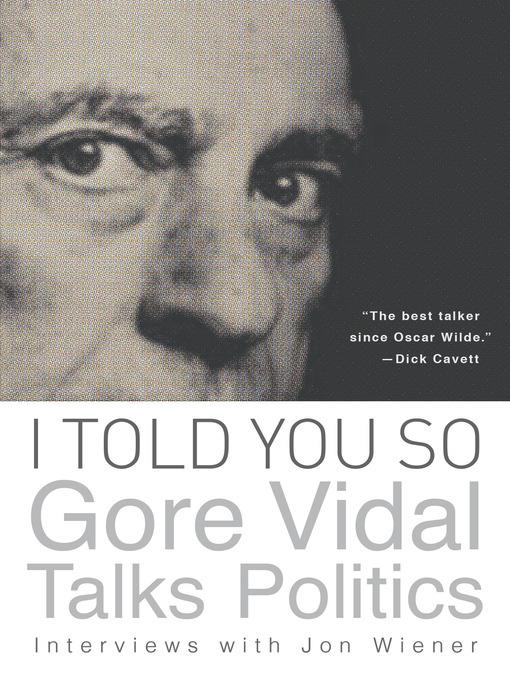
I Told You So
Gore Vidal Talks Politics: Interviews with Jon Wiener
کتاب های مرتبط
- اطلاعات
- نقد و بررسی
- دیدگاه کاربران
نقد و بررسی

March 4, 2013
Vidal, who died in 2012, never lacked for a pointed bon mot; his prolific output included novels, plays, essays, and memoirs. In this enjoyable but slight volume, Wiener (How We Forgot the Cold War), a contributing editor to the Nation and a radio host, presents four extended interviews he conducted with Vidal between 1988 and 2007. The conversations focus on politics, both in the context of Vidal’s historical fiction and in real life, including his campaigns for Congress in 1960 and 1982. Among other topics, Vidal discusses his Washington, D.C., upbringing and his grandfather, a senator from Oklahoma; theories about Lincoln and F.D.R.; his take on populism and party politics; and his assessment of the Bushes and the Gores. Though Vidal remains piquantly opinionated, the book serves more as an aperitif than a meal. For the uninitiated, it will surely whet the appetite to read Vidal’s novels, or to find essays that more fully explicate his political positions. Wiener also frustratingly repeats questions, with the intent of providing us with different answers from Vidal at different times and to different audiences, but a more expansive approach might have served the volume better. And, as Wiener himself notes wistfully, one also does yearn for the distinctive sound and cadence of Vidal’s mesmerizing voice. Agent: John Oakes.

March 1, 2013
These transcripts of four interviews with the late man of letters offer some provocative volleys but cover the same ground too often and don't show Vidal fully amplifying his ideas. Nation contributor Wiener (History/Univ. of California, Irvine; How We Forgot the Cold War: A Historical Journey Across America, 2012, etc.) promises that the book "offers Vidal in a more sustained mode of conversation: developing arguments, tracing connections between past and present, citing evidence. Of course he provides plenty of one-liners and zingers along the way." The zingers have more staying power, whether he's identifying John F. Kennedy ("a friend of mine,") as "a flippant figure of no depth" and "a mistake as a president" or dismissing generations of the Bush clan as "the most negligible family in the country." The two shorter and more recent (2007 and 2006) interviews that begin the book were public performances in Los Angeles, with questions from the audience as well. The earlier and more substantial ones are from a radio interview in 2000 and a 1988 print piece in Radical History Review. Much is made throughout of Vidal's historical fiction, particularly Empire (1987), his once scandalous Myra Breckinridge (1968) and his best-known play, The Best Man (1960). His sympathetic interviewer never questions his subject's assertions, whether he's claiming that this country has "the worst educational system for the average citizen, for the non-rich, in the world" or charging that the culture in general and the New York Times in particular had it out for him following an early novel about gay life. He also believed that Franklin Roosevelt had advance warning of Pearl Harbor and that Bush knew about the 9/11 attacks and could have stopped them. Missing the voice and presence of a man who could be an outrageously entertaining speaker, these transcripts fail to match the depth of his writing, as well.
COPYRIGHT(2013) Kirkus Reviews, ALL RIGHTS RESERVED.

April 15, 2013
Marking the first anniversary (July 31) of Vidal's death, at age 86, Weinera University of California at Irvine history professor, Nation contributing editor, and Pacifica Radio hostgathers four of his many interviews with the outspoken novelist, essayist, screenwriter, and occasional political candidate, whom TV talk-show host Dick Cavett dubbed the best talker since Oscar Wilde. The interviews travel back in time: Weiner chats with Vidal at the 2007 Los Angeles Festival of Books, at a 2006 session of the Los Angeles Institute for the Humanities, and at the Plaza Hotel during the shadow convention lampooning the 2000 Democratic Convention. The volume's fourth conversation was Weiner's initial, 1988 encounter with the acerbic author of Tales of Empire, Myra Breckinridge, The Best Man, and The City and the Pillar: an interview at Vidal's Ravello, Italy, home that was originally published in Radical History Review. One need not share Vidal's often contentious political preoccupations to welcome this return of Vidal's inimitably confident, never remotely tentative voice. Essential for libraries where Vidal's novels and nonfiction are popular.(Reprinted with permission of Booklist, copyright 2013, American Library Association.)

























دیدگاه کاربران